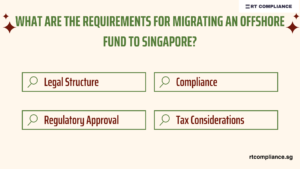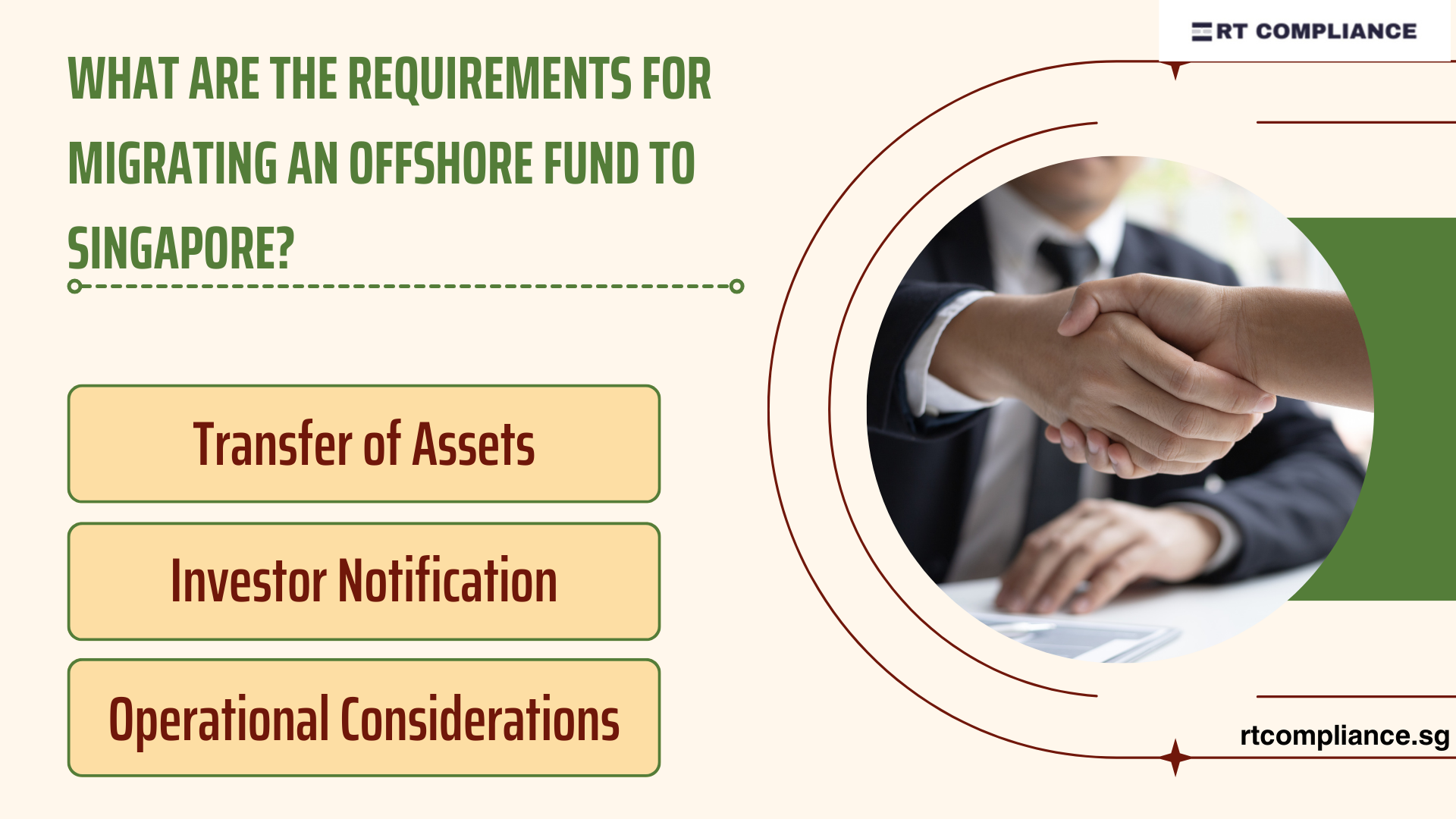What are the requirements for migrating an offshore Fund to Singapore?
Do you own an investment fund that is currently domiciled in an offshore jurisdiction? If yes, have you thought of relocating it to Singapore?
If that is the case, then you are in the right place. This article offers you the necessary guidelines to migrate an offshore fund to Singapore and make it legal to run its operations referring to the Offshore Fund Migration to Singapore process.
We will venture into the investment funds sector relating to the Cayman Islands, despite fund managers operating in Singapore, and keep in mind the VCC financial structure in Singapore.
Many fund managers globally often choose Singapore as the best center for funds since it has a stable regulatory framework that attracts international managers to migrate or re-domicile investment funds in Singapore. It has regulations that encourage investments in the financial sector.
The Amendments in the Private Funds Sector in the Cayman Islands (Foreign Fund Migration to Singapore)
Currently, the Cayman Islands private funds sector operates under regulations that were amended a while back. Private funds run under the Cayman Islands Monetary Authority’s jurisdiction as the area works on the anti-money laundering policies. The island went to a complete turnover a few months ago as every private fund migrating to Singapore needed to adhere to the laws. As a result, the sector runs under stricter regulations which results in a higher cost. The law states that:
✔️ Private funds must be audited annually by an officer approved by the CIMA
✔️ The four-eyed rule that state every firm need two or more directors and two naturally employees are listed
✔️ Firms must name anti-money laundering registered officers
✔️ Demonstrate compliance to the current laws
The regulatory framework promotes transparency in the financial sector without limiting its operations.
The Cayman Islands offers funds to the Private Fund sector, but there are considerations to keep in mind when applying for the funds, including:
- Costs that come with these funds are high, and you must include compulsory audits‘ cost
- There is no guarantee that the government won’t add more laws with time since the island introduced more laws affecting the Private Fund sector last year
- The Cayman Islands remains in the list of non-cooperative jurisdictions and low-tax
Why Migrate Offshore Fund to Singapore? (Advantages of Migrating Fund to Singapore)
Recent reports claim that many international business people are opting to transfer offshore funds to Singapore. Why is that? Setting up a business and operating it in the country is straightforward. The country features a stable regulatory structure that features:
✔️ Powerful regulatory standards
✔️ High-quality labor resources
✔️ Good administration
✔️ Influential global connection
Reports from the last couple of years show how many fund managers have moved their businesses to Singapore.
Step-by-Step Migration Process
Migrating an offshore fund to Singapore involves a series of steps to ensure compliance with local regulations and a smooth transition. Here’s a step-by-step migration process:
- Evaluate Fund Structure and Jurisdictional Considerations
Assess the fund’s existing structure, jurisdiction, and whether it is eligible for migration. Consider changes in regulatory requirements, tax implications, and investor structure. - Choose the Appropriate Fund Structure in Singapore
Decide on the type of fund to set up in Singapore, such as a Variable Capital Company (VCC), Exempt Private Fund, or Limited Partnership (LP), based on your investment strategy and investor profile. - Engage Local Advisors and Legal Counsel
Engage legal, tax, and compliance advisors to navigate the regulatory and operational considerations for fund migration. - Apply for the Relevant Licenses
Apply for the necessary licenses with the Monetary Authority of Singapore (MAS), such as Capital Markets Services (CMS), Registered Fund Management Company (RFMC), or Financial Adviser’s License (FAL). - Transfer Assets and Liabilities
Facilitate the legal transfer of assets, liabilities, and investor rights from the offshore fund to the new Singaporean entity. This may include structuring asset transfer agreements and drafting new investor documents. - Update Fund Documents
Amend the fund’s offering documents (e.g., prospectus, subscription agreement) to comply with Singapore’s regulatory requirements. - Notify Investors and Finalize Migration
Communicate with existing investors regarding the migration process, and ensure all necessary approvals are in place. Finalize the migration by registering the fund in Singapore. - Ongoing Compliance and Reporting
Once the fund is established in Singapore, ensure continuous compliance with local regulations, including regular financial reporting and updates to the MAS.
Document that needed:
The migration process requires several key documents to ensure compliance and a smooth transition:
- Fund Formation Documents
- ✔️ Original fund’s Constitution/Articles of Incorporation
- ✔️ Existing Shareholders/Partners Agreements
- Fund Manager’s Licensing Documents
- ✔️ Application for relevant MAS licenses
- ✔️ Documents related to the fund manager’s qualifications and experience
- Investment and Offering Documents
- ✔️ Offering Memorandum or Private Placement Memorandum
- ✔️ Subscription Agreements and Investor KYC (Know Your Customer) information
- Transfer Agreements
- ✔️ Asset Transfer Agreements outlining the legal transfer of assets, liabilities, and investor rights
- Tax and Legal Opinions
- ✔️ Tax Opinion on the migration’s impact on the fund’s tax status
- ✔️ Legal Opinion on the structure’s compliance with Singapore regulations
- Corporate Governance and Compliance Documents
- ✔️ Fund governance structure and Risk Management Framework
- ✔️ Compliance program documentation (e.g., AML/CFT procedures)
- Investor Communication Documents
- ✔️ Investor Notifications and consent forms for migrating the fund structure
The VCC and Offshore Fund to Singapore VCC Migration
The Variable Capital Company (VCC) Act has advanced the financial environment. It is a structure that encourages the Singapore-based asset management sector, family offices, and funds to re-domicile in Singapore. This act is bold, but its effectiveness has placed Singapore among the top countries operating in the international investment sector.
Requirements for Offshore Fund to Convert to VCC
The VCC structure offers flexibility in:
✔️ Segregating assets and liabilities
✔️ Enabling tax efficiency
✔️ Supporting various fund structures (e.g., migrating offshore unit trust to Singapore, limited partnership fund, or investment company)
Fund Migration Services Singapore – Get Legal Advisors and Consultants
Hiring consultants becomes vital for conducting a smooth Singapore fund re-domiciliation process in offshore fund relocation to Singapore. Your guide for Singapore fund re-domiciliation needs these professionals to provide expert advice.
- MAS requirements for fund migration
- The financial effects which investors experience upon moving funds to the Singaporean territory need detailed examination.
- The migration of an offshore fund to Singapore will carry specific financial costs.
Whether you are migrating a fund to VCC, setting up a licensed fund management company, or navigating Singapore fund management regulations, expert support is key.
Benefits of Migrating to Singapore (Beyond Requirements)
Migrating an offshore fund to Singapore offers several strategic advantages that go beyond just meeting regulatory requirements:
1. Access to a Robust Financial Ecosystem
Singapore’s well-established financial services infrastructure offers a conducive environment for fund managers, including access to global investors, capital markets, and banking services.
2. Investor Confidence and Reputation
As one of Asia’s leading financial hubs with a strong regulatory framework, a Singapore-based fund can enhance its credibility, attracting both institutional and high-net-worth investors who prioritize regulatory transparency.
3. Tax Incentives and Efficiency
Singapore provides various tax benefits, such as exemptions under the Singapore Income Tax Act for certain funds, making it an attractive location for structuring tax-efficient investment vehicles.
4. Regulatory Certainty and Stability
With MAS as the regulatory authority, Singapore offers a stable and predictable regulatory environment, reducing the risks associated with regulatory changes compared to some offshore jurisdictions.
5. Operational Efficiency
Singapore offers ease of doing business with a strong legal and operational framework, making it simpler to manage and govern funds. The migration process often streamlines administrative tasks and increases operational efficiencies.
6. Access to Regional Markets
Being a key financial hub in Southeast Asia, Singapore provides access to a rapidly growing regional market, making it easier to tap into investment opportunities in Asia.
7. Enhanced Compliance Standards
Aligning with MAS regulations strengthens the fund’s compliance framework, reducing exposure to potential legal or reputational risks.
Overall, migrating an offshore fund to Singapore opens up new opportunities for growth, operational efficiency, and investor trust while adhering to global best practices in fund management and compliance.
Conclusion
The VCC act has boosted Singapore’s ability to compete at the International investment level improving the fund to Singapore’s Management sector. Its regulatory framework also plays a crucial role in making Singapore the home for international fund managers.






